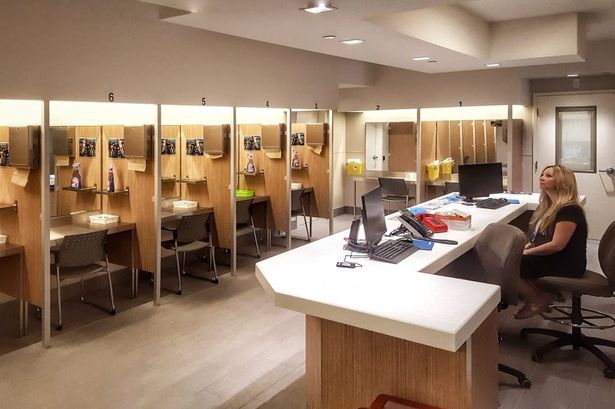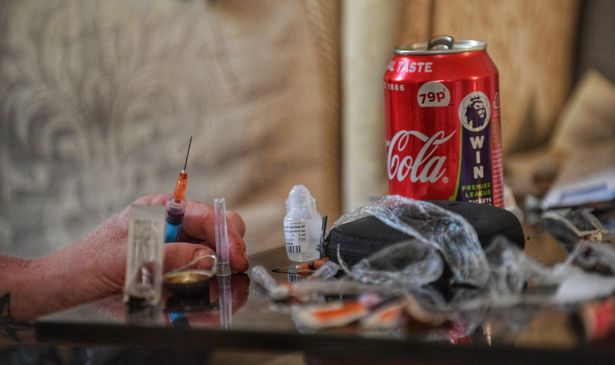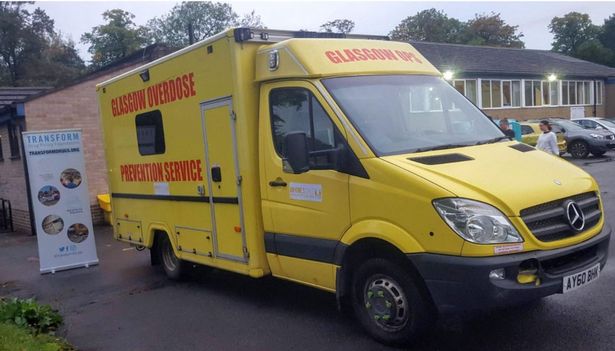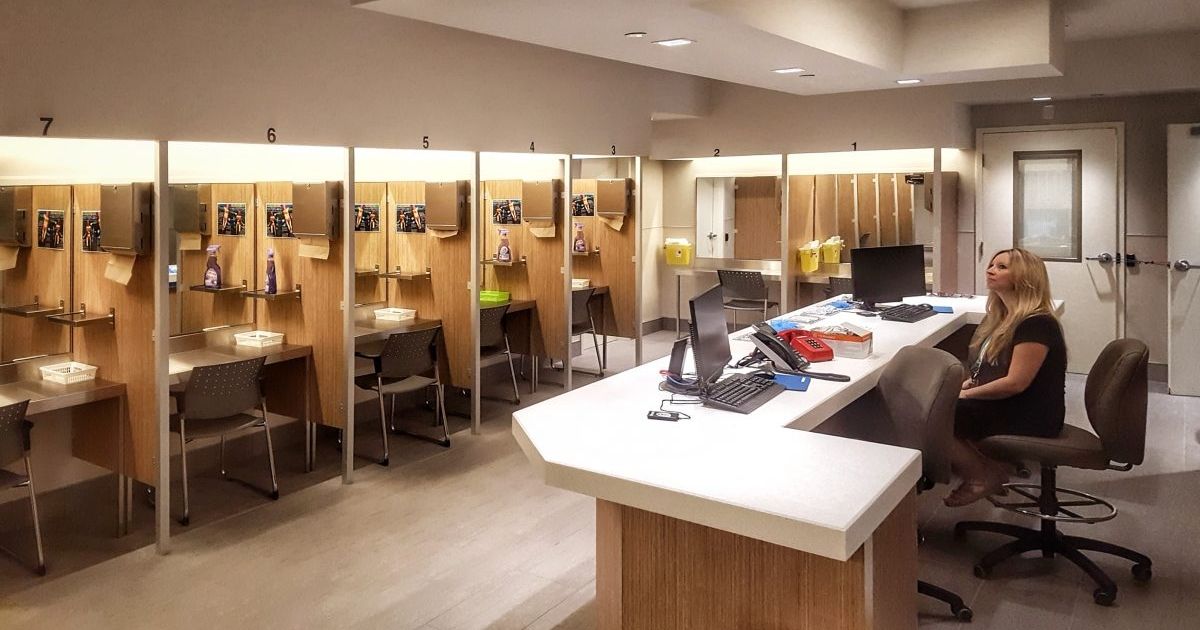The first official Overdose Prevention Centre is already saving lives in Glasgow Inside a permanent Overdose Prevention Centre in Canada(Image: Transform Drug Policy Foundation)
Inside a permanent Overdose Prevention Centre in Canada(Image: Transform Drug Policy Foundation)
A plan for Bristol to set up England’s first ‘Overdose Prevention Centre’ – a facility which allows illegal drug users to take their drugs in a supervised space – took a big step forward last night with a major meeting held to discuss how it would work.
Britain’s first Overdose Prevention Centre opened earlier this year in Glasgow, but only after years of legal wrangling and a decision by politicians in Scotland that police wouldn’t prosecute those who run it.
Six months on, and the doctor who runs the NHS service in Glasgow is in Bristol to talk to health chiefs, drug charities and police about how it is going, and whether such a facility could be started in Bristol. Whether an Overdose Prevention Centre (OPC) could legally be set up in Bristol remains a grey area, with the UK Government maintaining it would be against the law, but uncertainty over whether the police and the CPS in England would actually prosecute medical professionals who did set one up.
OPCs work by providing a supervised space for people to take illegal drugs – usually heroin, crack, or synthetic opioids – with emergency treatment available should they overdose. In Glasgow, the first sanctioned ‘Safer Drug Consumption Facility’, called The Thistle, opened in January and in the first 12 weeks there were 16 overdose incidents.
The people running the facility say those people would almost certainly have died had they been at home or out on the streets when that happened, but their lives were saved by staff having medication to bring them round and call paramedics quickly.
Staff at The Thistle are also able to support people in other areas, by referring them to other services, like housing or for health treatment, and in the long term, people taking drugs are more likely to get treatment for that addiction than if they took their drugs privately.
Dr Saket Priyardarshi is the associate medical director for alcohol and drug recovery services at the NHS in Glasgow, and the clinical lead at The Thistle. He said he was ‘delighted’ to come to Bristol and share what lessons could be learned in setting one up here.
“The Thistle, the UK’s first sanctioned Safer Drug Consumption Facility, is a trauma informed, harm reduction service with close links to a wider recovery oriented system of care and it is already making a difference for some of the most vulnerable people in Glasgow city,” he said.
“Although it is only six months since it became operational, and a full evaluation will report in due course, We are very happy to share our experience and learning to date with others considering implementing such services in the UK,” he added.
 Drug paraphernalia associated with heroin use (stock image)(Image: Jonathan Myers)
Drug paraphernalia associated with heroin use (stock image)(Image: Jonathan Myers)
The project in Bristol is a partnership between the Transform Drug Policy Foundation and the University of Bristol, and the Thursday evening event looked at solutions to the growing number of overdose deaths in Bristol and the surrounding region.
Nitazenes, new synthetic opioids, were linked to 22 deaths in the south west region in just the past 11 months.
The city council is also on board, with the council’s Night Time Economy Adviser Carly Heath taking part, along with Adam Holland, a clinical academic at the University of Bristol, Steve Rolles, the senior policy analyst at Transform Drug Policy Foundation, and Meg Jones, from leading harm reductions services organisation Cranstoun.
Bristol leading the way
Bristol has been a pioneer of alternative policies in dealing with illegal drug use over the past decade or so. In 2016, Avon and Somerset police introduced one of the UK’s first drug diversion schemes which referred people to treatment and support instead of prosecution if they are caught with small amounts of drugs.
The city is also home to the UK’s first city centre drug checking service, run in partnership by the council, which tests drugs people submit confidentially, and in 2022, the city launched the first city-wide harm reduction programme.
In 2021, the late Peter Krykant brought his unofficial drug consumption space to Bristol as part of a campaign to get them legalised in the UK. He started one in a converted ambulance in Glasgow, and its success convinced the authorities there – the police, politicians and the NHS – to start The Thistle at the beginning of 2025.
 An image of an Overdose Prevention Centre – a mobile drug consumption space – being brought to Bristol (Image: Transform Drug Policy)
An image of an Overdose Prevention Centre – a mobile drug consumption space – being brought to Bristol (Image: Transform Drug Policy)
Having a venue for people to take drugs in a safer environment in Bristol too is the next logical step, campaigners say. Such overdose prevention centres are already up and running right across Europe, the US and Canada, with another planned in Ireland.
“There is considerable international evidence showing that overdose prevention centres save lives, reduce harm, and connect people with vital support,” explained Mary Ryder, from Transform Drug Policy Foundation.
“Bristol should be proud to be leading the way in shifting how we respond to drug use. We’re excited to be part of this conversation and to work alongside others committed to the health and wellbeing of our communities as we explore the next steps together,” she added.
What does the UK Government say?
The legalities around Overdose Prevention Centres are a grey area, and the UK Government appears to have created a two-tier system in Britain, with such centres effectively decriminalised in Scotland, but not in England – yet.
The Scottish Parliament voted to allow the NHS to set one up in Glasgow, ordering the police and prosecutors there not to intervene or prosecute people who work there, or arrest those entering with illegal drugs.
Prime Minister Sir Kier Starmer said he would respect the wishes of the Scottish Parliament, even though the laws around possession of illegal drugs are UK-wide. But in England, the Government has so far refused to allow the same thing to happen here.
READ MORE: UK on ‘verge of public health crisis’ as synthetic opioid causes multiple deaths across South WestREAD MORE: Bristol council considers ‘safe injection rooms’ for heroin addicts as drug deaths rise
Last month, when Green Party MP Sian Berry raised the contradiction with Lucy Rigby MP, the Solicitor-General, in Parliament, she said the Government had ‘no plans’ to amend the law.
“It is absolutely right that we ensure that those who fall into drug addiction are able to access adequate support, services and routes to rehabilitation,” she said.
“As the Minister for Policing said to the Scottish Affairs Committee recently, the Government do not have plans to amend the law to permit the introduction of drug-consumption facilities. We are clear, however, that drug deaths are avoidable, and we are committed to supporting more people into recovery so that they can live healthier and longer lives,” she added.
 Bristol Live WhatsApp Breaking News and Top Stories
Bristol Live WhatsApp Breaking News and Top Stories
Join Bristol Live’s WhatsApp community for top stories and breaking news sent directly to your phone
Bristol Live is now on WhatsApp and we want you to join our community.
Through the app, we’ll send the latest breaking news, top stories, exclusives and much more straight to your phone.
To join our community you need to already have WhatsApp. All you need to do is click this link and select ‘Join Community’.
No one will be able to see who is signed up and no one can send messages except the Bristol Live team.
We also treat community members to special offers, promotions and adverts from us and our partners. If you don’t like our community, you can check out at any time you like.
To leave our community, click on the name at the top of your screen and choose ‘Exit group’.
If you’re curious, you can read our Privacy Notice.
Click here to join our WhatsApp community.
